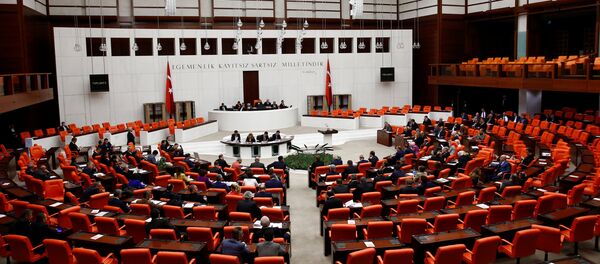President Erdogan has vowed to "evaluate" the constitutional amendment package as soon as possible. After his approval, the issue is to be submitted to a public referendum later in April, where the public will vote on 18 amendments to the country's constitution.
If approved in the referendum, the new legislation will come into force starting from 2019.
By then, Turkey "would be abandoning the European-style 'parliamentary system' it has been adhering to since the beginning of the republic in 1923 – or even from the first Ottoman Constitution of 1876," says the US-based website Al-Monitor, which reports on the Middle East.
In this system, it further elaborates, the president is a nonpartisan head of state, whereas the real executive power lies in the hands of the prime minister.
"Erdogan had no problem with this design throughout his first decade in power when he himself was the prime minister. Once he decided to run for the presidency in 2012, however, he and his advisers began advocating the 'presidential system' and a new constitution that would allow that."
Also, according to amendments, the President will have the right to dissolve Parliament at any time. The composition of the Parliament will be expanded from 550 to 600 legislators.
"This, in fact, has been the grand ambition of President Recep Tayyip Erdogan and his Justice and Development Party (AKP) in the past few years. But only now, thanks to the political alliance they formed with the Nationalist Action Party (MHP), they can find enough mandates in the parliament – more than 330 seats out of 550 – to realize this major transition," Al-Monitor says.
Commenting on the issue, Temel Karamollaoglu, the chairman of the country's Felicity Party (Saadet Partisi/SP) explained to Sputnik Turkiye why his party does not support the constitutional reforms.
While not ruling out completely the transition towards the new form of governing, the politician and his party are convinced that it should be based on a different principle – the principle of separation of powers.
"Under such a principle the president is the head of the executive power. He does not need the approval of Majlis (the country's parliament, also referred to as Grand National Assembly), however he, in turn, can't interfere into the work of the parliament," he further elaborated.
The parliament, he said, is a legislative body, which also executes control over the country's budget and its executive power.
However the constitutional amendments which were submitted to parliament for approval, completely contradict the idea of the separation of powers.
"The suggested amendments grant the president the right to dissolve the parliament. This might lead to a situation when the president can simply dissolve the parliament if it does not approve the laws which answer his own interests," Temel Karamollaoglu explained to Sputnik.
The president gets the leverage to influence on the judicial power, which should remain independent. And on the legal system, which the whole state structure should be based on, the politician continued.
However, the politician further noted, the fact that President Erdogan has not approved the document right away and postponed it until his return from the East Africa, where he is currently on a visit, might signify that he might offer some more changes to the suggested amendments and might send it back for to parliament for further approval. At least, this is what the Felicity Party hopes for, he finally stated.
Never miss a story again — sign up to our Telegram channel and we'll keep you up to speed!






